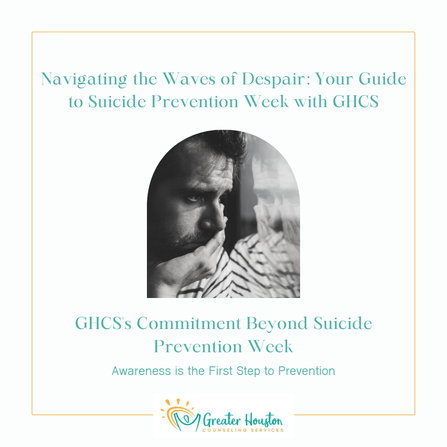|
As we stand at the threshold of Suicide Prevention Week, a campaign fervently observed every year to raise awareness about suicide and foster prevention in the US, we feel compelled to stand shoulder-to-shoulder with individuals who find themselves grappling with the weight of despair and the seemingly insurmountable hurdles of life. At Greater Houston Counseling Services (GHCS), we are deeply committed to shining a light on the pathways to hope, resilience, and recovery. The Alarming Statistics Recent data paints a heartbreaking picture of the escalating suicide rates in the US, emphasizing the urgency to lend a helping hand to those in the abyss of despair. It is pivotal to foster environments where people can openly discuss mental health concerns without the fear of stigma. The GHCS Touch: Nurturing Hope and Healing At GHCS, we offer an empathetic ear and a safe harbor for individuals navigating the tumultuous waters of mental health. Our professional team is skilled in unraveling the complex emotions that underscore suicidal thoughts, utilizing proven therapeutic strategies such as Cognitive Behavioral Therapy (CBT) to pave a pathway to healing. Services Tailored for Your Needs Awareness is the First Step to Prevention As part of our commitment to suicide prevention, we encourage everyone to be vigilant about the signs of mental health distress in their loved ones. A simple act of reaching out can sometimes be a lifesaver. Be it a reassuring conversation or guiding someone to professional help, your involvement can make a world of difference. GHCS's Commitment Beyond Suicide Prevention Week While Suicide Prevention Week serves as a crucial period of amplified awareness, GHCS's commitment to this cause extends beyond a week-long campaign. We endeavor to foster a community where mental health is prioritized every single day. Join Hands with GHCS We warmly invite you to collaborate with us in this noble cause. Share our resources, participate in our therapy sessions, or simply spread the word — every step counts in building a society free of stigma and rich in understanding and empathy. To learn more about our services and how you can play a part in this vital mission, visit our website today and become an advocate for mental health with GHCS. Suicide is preventable. Together, we can create a ripple of hope and nurture a society grounded in compassion and understanding. Remember, GHCS is here to support you in every step of your journey toward mental well-being. If you or someone you know is in crisis, don’t hesitate to reach out to the National Suicide Prevention Lifeline at 1-800-273-TALK (8255)
0 Comments
 A study by the National Institute of Mental Health in 2014 found that 15.7 million adults in the U.S., between the age of 18 and above, experienced at least one depressive episode in the last one year. It has also been determined that people in certain professionals have a higher risk of suffering from depression. For example, lawyers and doctors have a high potential for experiencing depression. Despite the glaring facts on depression, a few people know much about its nature and impact. Depression is Different For Different People There is no one size fits all sign of depression. However, depression is easy to recognize when it is characterized by sadness. Some of the other signs and symptoms of depression include:
Depression is Different From An Episode of Sadness Sadness is one facet of depression but it does not necessarily define depression. You may be sad but not depressed. Sadness is a reaction to hard times in life and is likely to pass with time. On the other hand, depression interferes with normal functioning and daily life. It causes pain for you and the ones you care about. It is a real illness that is often referred to as clinical depression or depressive disorder. You cannot simply get over depression; most of the people suffering from this condition require treatment. Depression Could Be Genetic New studies have revealed that depression may be genetic. According to a new study, certain regions in the human DNA are associated with the disorder. Scientists discovered that there are around 15 genes in the human chemical makeup that are involved with depression. These same genes are linked to the development of neurons, the chemical messengers in the brain. Diet Contributes To Depression Whatever you consume can either boost or dampen your mood. Studies have found that foods containing vitamin B12, omega 3 fatty acids, and tryptophan amino acids change the fats in your brain membrane and promote the production of brain chemicals such as dopamine and serotonin. On the other hand, processed foods and refined sugars increase blood glucose levels and aggravate depression. Regular Exercise Can Alleviate Depressive Feelings Exercise is one measure you can take to avoid depressive feelings. Exercise boosts endorphins, serotonin, and other brain chemicals. Exercise stimulates the growth of new brain cells the same way anti-depressants do. Depression Affects Women More Than It Affects Men Studies show that women have a high likelihood of suffering from depression than men. The reason for this can be partly attributed to a woman's hormones. Women are likely to experience depression when they are pregnant or after a pregnancy because of hormonal changes. Another difference is that women are more likely to reveal their condition while men will go through self-denial and feelings of shame before taking their condition seriously. There is also the factor that women tend to outlive men and; therefore, encounter loneliness and other difficult times in life when compared to men. Depression Does Not Have To Be Triggered By Anything While a difficult period or a discouraging or heart breaking episode may trigger depression, sometimes there is no explanation for depression. Since it is an illness, depression can pounce on you at any time. If you suddenly lose interest in things you normally enjoy, lose your appetite, or start gaining weight, these may be signs that your depression is caused by some biological process. In such cases, it would be advisable to consult a doctor. Depression May Be Normal For Some People While some people may experience temporary episodes of depression, others have depressive personalities that are constant throughout their lives. The best way to deal with such a condition would be acceptance and adaptation. Many people are able to survive with these depressive personalities. In fact, successful depressives have been observed to be sensitive, empathetic, and deep thinkers. There Are Different Types of Depression Depression can take on many forms. Some people may experience mild depression which is usually common after some life-changing event. Post partum depression affects new mothers whereas psychotic depression affects people who are suffering from psychosis. Persistent depressive disorder lasts for at least 2 years whereas seasonal affective disorder develops during specific seasons. The Take Away Depression is a clinical condition that many tend to take lightly. This illness does not discriminate on whether you are a child or adult, and affects people differently. There are many forms of depression with varying signs and symptoms. If you suspect that you or a loved one is depressed, you need to consult a physician before the condition gets worse. We have clinicians available to offer you the support you need to combat depression. Click here to get more information!  Depression in teens is a serious issue that if left unaddressed can lead to a variety of negative consequences. Teenagers, like adults, have an increased chance of becoming depressed during the holiday season. This affliction alters how young people think and feel, and can lead to behavioral issues. In some cases, being depressed can even cause teenagers to experience physical distress. It is important to keep in mind that adolescence is a tumultuous time that will cause teenagers to have many highs and lows emotionally. Because of this, there is no need to panic if a teenager seems a little sad occasionally. However, the state of being clinically depressed in teenagers is a very real condition and it is important for parents and loved ones to recognize the signs. Reasons Adolescents Become Clinically Depressed A central cause of an individual becoming clinically depressed has not been identified but there are a variety of causal factors. • Biochemical Factors- Neurotransmitters are responsible for the transfer of signals throughout the brain and nervous system. When Neurotransmitters do not function properly one result can be the increased likelihood that an individual can become depressed. • Hormonal Disruption- Sudden changes in the body’s hormones can cause teenagers to become depressed • Genetic- Adolescents that have relatives who have been diagnosed as clinically depressed are at a higher risk of developing the disease themselves • Traumatic Childhood Events- Trauma experienced in childhood can increase the chances of an individual suffering from being depressed in adolescent years. Symptoms Of Clinically Depressed Teenagers The signs and symptoms for clinically depressed teenagers can vary greatly in severity but often include obvious changes in attitude and behavior. These changes often manifest in dysfunction at home, in school, or in social behaviors. I would suggest that parents closely monitor their teenagers if seeing any of the following behaviors: • Expressions of sadness, especially crying for no known reason • Sudden irritability • Feelings of hopelessness • Anger and frustration over small matters • Lack of interest that once was a source of enjoyment • Inability to get along with family and friends • Grim outlook on future • Inability to reason, concentrate, or to remember things This is by no means an exhaustive list of signs a teenager may be suffering from the effects of being depressed but presents an idea of things to be aware of. I would also like to reiterate the point that adolescence is a time of intense turmoil in the life of teenagers and many of these issues may be seen occasionally in teens who are not clinically depressed. A good barometer to use is if these feelings are accompanied also by sudden changes in behaviors like: • Lethargic behavior • Extreme change in sleeping habits • Sudden changes in appetite • Drug and alcohol usage • Restlessness or inability to sit still • Neglectful of hygiene or appearance • Disruptive behavior at home or school • Poor performance at school, especially if the teenager was previously a good student When To Seek Professional Help If a teenager that you suspect is depressed continues to exhibit any of these symptoms it is important to talk with a doctor or mental health expert that has experience working with adolescents. The school or family doctor of the teen is a good place to look for resources or references to seeking out any help a teen may need. Teens suffering from clinical depression are unlikely to get better on their own and this disorder can subject them to many consequences, both immediate and long-term if left untreated. Depressed teenagers are at a higher risk for suicide, alcohol and drug abuse, delinquency and a host of other potential problems. When To Seek Emergency Help Thoughts of suicide are often a byproduct of clinical depression in teenagers. Do not take any chances when a teen expresses suicidal thoughts or feelings. Always err on the side of caution and assume any thoughts of suicide to be a credible threat. Final Thoughts Teenagers that are clinically depressed is a serious issue and should be addressed with the necessary diligence. Teenagers that are clinically depressed are at risk for a number of negative consequences that can have adverse effects on their futures. Adolescent angst is normal and should not be confused with the more serious condition involving clinically depressed teenagers. It is important for parents and loved ones to first know the signs and symptoms of a teen that is clinically depressed, and then to seek out the help the teen needs. |
Archives
January 2024
Categories
All
|
|
|
Share This Page
Greater Houston Counseling Services
"Making your day a little easier" Phone: (832) 717-7166 |
Four locations across the Houston area |





 RSS Feed
RSS Feed